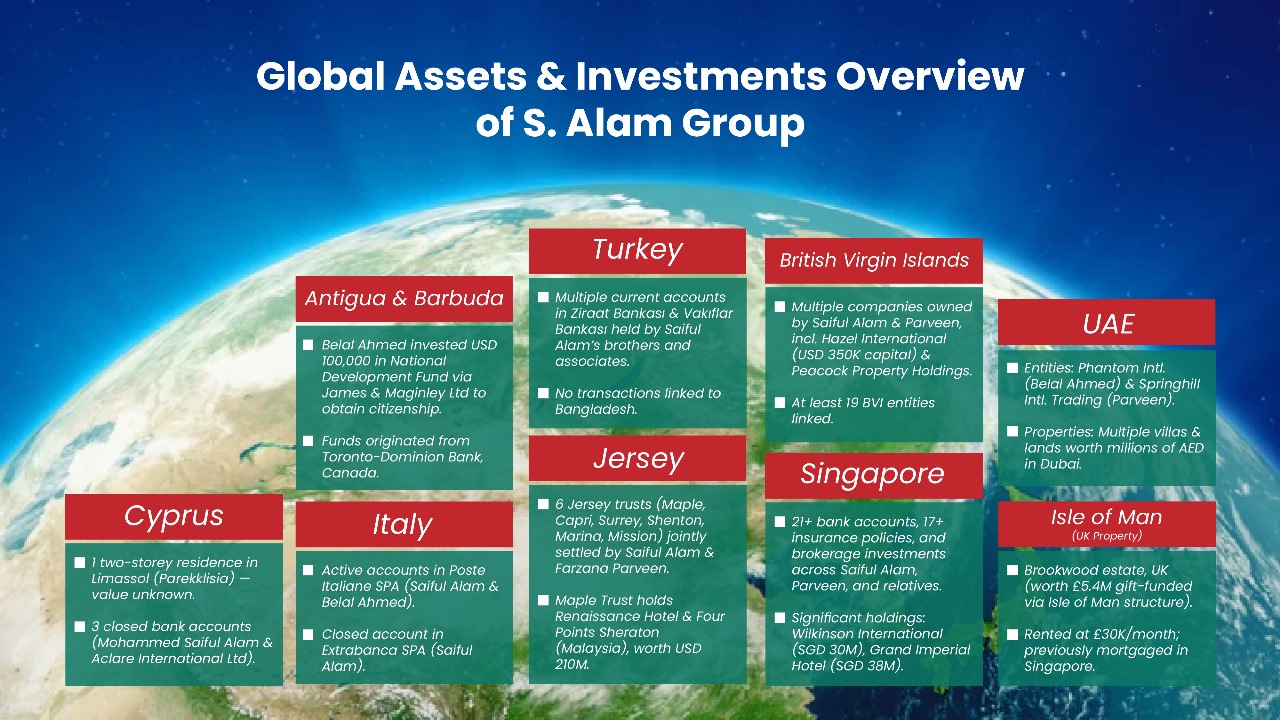Investigators unearthed S Alam’s corrupt footprints in eight new countries
-689acd195cec4.jpeg)
For years, the vast corruption and money laundering orchestrated by Mohammed Saiful Alam, chairman of the S. Alam Group, and his family have been an open secret in Bangladesh.
The Chittagong-based conglomerate’s meteoric accumulation of wealth–both at home and abroad–has started to surface in the past two years, especially after the fall of the autocratic regime of Sheikh Hasina.
Now, new findings suggest that the scale of the operation is far greater than previously understood, placing it among the most audacious financial scandals in the modern world’s history.
According to a recent progress report compiled with intelligence from at least nine foreign financial watchdogs, the S. Alam Group is accused of siphoning off nearly 223,855 crore taka–about $20 billion–through a network of at least 470 shell companies registered across nine countries.
The amount represents almost 4 percent of Bangladesh’s current GDP, underscoring the unprecedented breadth of the alleged scheme.
Ordinarily, when the Bangladesh Financial Intelligence Unit (BFIU) seeks to determine whether citizens hold assets abroad, its inquiries are limited to a familiar roster of destinations–Australia, India, the United States, the United Kingdom, the United Arab Emirates, Singapore, Malaysia, Hong Kong, Thailand and Switzerland.
But the S. Alam Group probe has broken precedent. Under the direction of Md. Mosharraf Hossain, a key member of the special review panel examining the conglomerate’s activities, investigators expanded their reach to an unprecedented 117 countries–marking the first global asset search of its kind in Bangladesh’s history.
-689acb9ab9fd2.jpeg)
Footprints across the continents
That effort paid off. Financial Intelligence Units in jurisdictions as varied as Cyprus, Antigua and Barbuda, Italy, Turkey, Singapore, Jersey, the British Virgin Islands, the UAE, and the Isle of Man confirmed that individuals tied to the S. Alam Group maintains investments there.
Seven of those countries have already provided actionable intelligence to the joint investigation team, while notes have been submitted for the remaining two.
Relying on precise documentation from the seven cooperating jurisdictions, the investigation secured court orders–through intricate cross-border legal channels–granting access to bank account records and investment details in four locations: Singapore, Jersey, Cyprus, and the British Virgin Islands.
Those orders are now with the respective authorities for execution, a source in the BFIU confirmed Bangla Outlook.
In the British Virgin Islands, investigators identified 19 companies registered under the names of Mohammed Saiful Alam or his family members, according to intelligence unit records.
Bangla Outlook independently verified these entities through the territory’s official corporate registry, finding that most were incorporated between 2018 and 2021–years when S. Alam Group’s expansion was already drawing scrutiny.
One company, Greenwich International Private Ltd, was established on August 26 last year–just weeks after the fall of Sheikh Hasina’s government.
The registry does not disclose capital investments for nearly all the entities, except for Hazel International Private Ltd, incorporated under Mr. Alam’s name on March 19, 2019, with a declared capital of $350,000.
In Jersey, a self-governing British Crown dependency often cited as a tax haven, S Alam and his wife, Farzana Parveen, were found to be joint settlers of six Jersey trusts, all administered by a local trust company.
Through
this arrangement, they own two five-star hotels with a combined market
valuation of $210 million.-689acc55c05b1.jpeg)
Multiple bank accounts and luxury villas
Investigators also traced significant holdings in Turkey, where at least 10 high-value bank accounts were discovered under the names of S Alam’s brothers, Shahidul Alam and Osman Goni.
While the account balances remain undisclosed, each was classified as “premium,” a designation typically reserved for accounts containing substantial deposits.
In the United Arab Emirates, the probe uncovered at least six luxury villas–valued between $350,000 and $1.8 million–registered to Belal Ahmed, Mr. Alam’s son-in-law. Ahmed also holds title to two plots of land in the UAE worth an estimated $4 million.
Meanwhile, in the Isle of Man, Ashraful Alam, the chairman’s son, is listed as the owner of a $7 million villa at Brookwood, 15 Princes Drive, Oxshott, Leatherhead, KT22 0U. The property, acquired in 2020, is recorded as a gift from his mother, Farzana Parveen.
Records also show that Belal Ahmed, the son-in-law of Mohammed Saiful Alam, purchased citizenship of Antigua and Barbuda through the country’s Citizenship by Investment Programme.
His application was processed via James and Maginley Ltd., an authorised marketing representative of the programme, with an investment contribution of $100,000 to the National Development Fund.
According to transaction documents, the funds for this contribution originated from a wire transfer of $127,045 sent from Belal Ahmed’s account in Mississauga, Ontario, Canada, at the Toronto-Dominion Bank.
The transfer was received directly by James and Maginley Ltd., which then facilitated the citizenship process.

S Alam’s corrupt empire
S Alam’s meteoric rise was built on a pattern of aggressive acquisitions, irregular financial practices, and large-scale looting–none more damaging than his encroachment into Bangladesh’s banking sector.
His dominance began with Islami Bank, long regarded as one of the country’s most reputable private institutions.
After the Awami League assumed power in 2009, moves to bring the bank under political and business control quietly gathered pace. The decisive takeover came on January 5, 2017.
Acting with the backing of military intelligence, operatives forcibly removed the bank’s chairman, vice-chairman, and managing director from their homes and transported them to the intelligence headquarters in Dhaka Cantonment.
There, they were compelled to sign resignation letters; their replacements were installed before the day was out.
That same year, on October 30, a similar playbook was used to seize control of Social Islami Bank Ltd. (SIBL). Prior to the takeover, S. Alam Group had secretly acquired nearly 50 percent of the bank’s shares through 19 proxy companies–an arrangement in direct violation of the Banking Companies Act of 1991.
The Anti-Corruption Commission (ACC) of Bangladesh found that S Alam and his associates created fake loans and investments in the names of his relatives to misappropriate large sums of money.
The ACC became concerned that S Alam and his family would try to move or transfer the money before the investigation was finished.
Because of this, the court ordered the Bangladesh Financial Intelligence Unit (BFIU) and the banks involved to freeze all the bank accounts of S Alam and his family members.
Since the Hasina government fell in August 2024, the ACC has filed two cases against S Alam and his wife for owning over 1,539 crore in illegal wealth.
The ACC also sued two of their sons, Ahsanul Alam and Ashraful Alam, for allegedly embezzling nearly 2,200 crore from Islami Bank.
—

